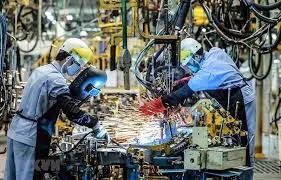
In this interview, Mr. NGUYỄN VĂN TOÀN, Vice President of the Association of Foreign Investment Enterprises (VAFIE), discusses the complexities of this situation and why he believes that full recognition is only a matter of time.
Journalist: - In your view, why has the U.S. not recognized Vietnam as having a market economy, despite previous positive assessments?
Mr. Nguyễn Văn Toàn: - I find it quite surprising. In the recent announcement by the U.S. Department of Commerce, they acknowledged Vietnam’s significant efforts toward becoming a complete market economy. They recognized many aspects of our progress but ultimately stopped short of fully acknowledging Vietnam as a market economy.
It’s also worth noting that many countries, such as the UK and Australia, have already recognized Vietnam as a market economy. These countries often refer to the U.S. when shaping their economic policies because of America’s influence on the global economy. Therefore, it’s perplexing that the U.S. hasn’t followed suit, especially considering the deepening relationship between the two countries. Last year, the U.S. and Vietnam elevated their ties to a Comprehensive Strategic Partnership, which should indicate a foundation of strategic trust. Moreover, when U.S. investors and representatives of major corporations visit Vietnam, they express strong trust in and commitment to the Vietnamese market. In my conversations with them, they all highly appreciate the opportunities in Vietnam.
- State intervention exists in all economies, even in the U.S. So, is the claim that Vietnam has "too much state intervention" a valid reason for the U.S.'s stance?
ˆ- Absolutely not. Every market economy involves some level of state intervention. The state and the market each play essential roles. The market operates according to objective laws and is efficient at allocating resources. However, the free market also has inherent shortcomings that can lead to instability and crises, which is where state intervention becomes necessary.
There’s a natural, symbiotic relationship between the state and the market. The state steps in to mitigate risks and ensure stability, allowing for balanced socio-economic development. Even in the U.S., the government intervenes when needed, especially in supporting domestic enterprises and managing macroeconomic policies. But this intervention happens within a framework that aligns with international rules. Therefore, it’s unfair to claim that Vietnam's state intervention is excessive or not in line with a market economy.
A recent example in Vietnam is the domestic gold market. Due to geopolitical tensions and economic instability in various regions, the Vietnamese gold market was significantly impacted, causing prices to fluctuate wildly. The government intervened, stabilizing the market and preventing further disruption. This is exactly when the state should intervene to restore balance. The U.S. does the same thing—when unemployment rises, they implement policies to support workers and businesses.
In short, the argument that Vietnam’s economy involves too much state control doesn’t hold water, especially when compared to other market economies.
- There’s concern that after the U.S., the European Union might also question whether Vietnam meets the criteria for a market economy. Given that the U.S. and the EU often have similar foreign policies, what’s your take on this?
- That’s a valid concern. Each country or region has its own criteria for determining whether an economy is market-based. For the U.S., there are six criteria, while the EU uses five. Recognizing Vietnam as a market economy is particularly important for the EU, as it is Vietnam’s third-largest export market since 2020. Being recognized by a large trading bloc like the EU would be very beneficial for Vietnam’s manufacturing and export industries.
There are many similarities between the U.S. and the EU in their economic and foreign policies, which is why some people are concerned. For example, both the U.S. and the EU have relatively low levels of direct investment in Vietnam. U.S. investors, for instance, invest around $300 billion globally each year, but only about $1 billion finds its way to Vietnam. The EU’s direct investments in Vietnam are similarly modest.
Some argue that U.S. and EU capital might be flowing into Vietnam through third countries like Hong Kong or Singapore, but direct recognition of Vietnam as a market economy could streamline investment and trade. It would benefit not only Vietnamese enterprises but also U.S. and EU investors, allowing for more direct engagement with Vietnam’s growing market.
- Thank you very much for your insights.




















